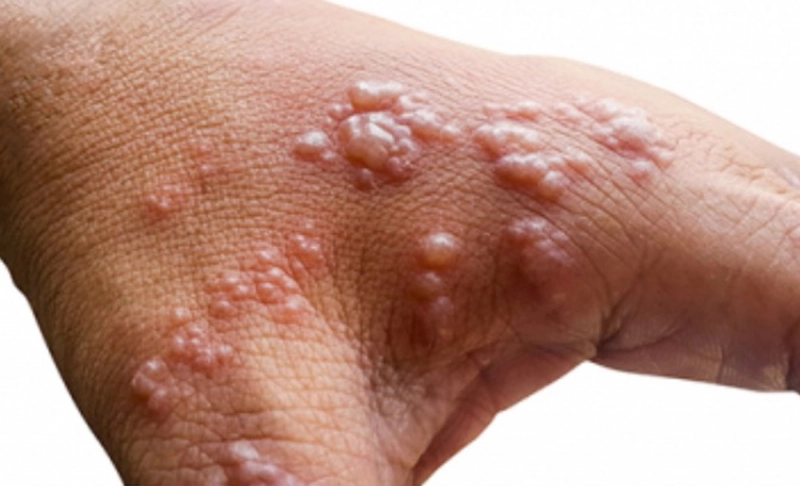By: Annie Priya
May 25 2022

Shingles is a reactivation of the chickenpox virus in previously infected individuals. Its transmission routes are not related to COVID-19 vaccines.
Social media posts about monkeypox have increased since May 13, 2022, after the World Health Organization (WHO) reported the first cases of monkeypox. Several posts have attempted to link the spread of the monkeypox virus to COVID-19 vaccines. They claim that the vaccines cause, among other adverse effects, skin lesions linked to monkeypox. One such post on Facebook with an image of shingles claimed that "shingles may be a side effect of the COVID-19 vaccine, which is one of the symptoms of monkeypox." However, this claim is false. According to the WHO, monkeypox is a zoonotic viral disease caused by the monkeypox virus, a member of the orthopoxvirus genus in the family poxviridae. It occurs primarily in tropical rainforest areas of central and west Africa, and it has occasionally spread to other regions. Its symptoms are macules (lesions with a flat base) to papules (slightly raised firm lesions), vesicles (lesions filled with clear fluid), pustules (lesions filled with yellowish fluid), and crusts that dry up and fall off. Shingles, or chickenpox, is not one of the symptoms. A study published by PubMed in 2021 reported two cases of shingles flare-ups in adults after an mRNA COVID-19 vaccination. The individuals previously had chickenpox in both cases, caused by the varicella-zoster virus (VZV), not shingles. Researchers note that the cases of shingles after vaccination may be a coincidence and that it might be a potential influence of stress and the immune response to the vaccine. It is worth noting that COVID-19 vaccines do not cause shingles, and a person will not directly contract shingles from a COVID-19 vaccine. According to studies, shingles only occurs in individuals with dormant VZV from a previous case of chickenpox or shingles. A cross-sectional study on herpes zoster (HZ) diagnosis, published in October 2020 by the University of California, found no evidence to substantiate an association between HZ and COVID-19 infection. Also, there was no increase in the number of HZ cases during the COVID-19 pandemic. Dr. Gerald Evans, chair of Queen's University's infectious diseases division in Kingston, Ontario, told CTV News, "It's not that the vaccine caused the shingles, the vaccine was just one of what could have been many different triggers to have produced an episode of shingles." The U.S. Centers for Disease Control and Prevention (CDC) has recommended that COVID-19 vaccines are safe and effective because the vaccine benefits outweigh the potential risks of contracting COVID-19. According to the U.S. National Institute on Aging, shingles is a disease caused by the reactivation of chickenpox caused by VZV. Even after recovery from chickenpox (usually as a child), the virus continues to live in some nerve cells. The virus is inactive in most adults, but for about one in three adults, the virus may become active again and cause shingles. Aside from the fact that shingles is not one of the confirmed side effects of any of the COVID-19 vaccines, the claim also says it is one of the symptoms of monkeypox, which is equally inaccurate. On May 2, the United Kingdom government website released an image of individual monkeypox lesions, which is entirely different from shingles. Monkeypox-related skin rashes are a characteristic symptom of this disease. They are easily distinguished from other types of rashes that may be vaccine-related. Monkeypox is not shingles, nor is it in any way linked to COVID-19 infection or vaccines. Therefore, we mark this claim as false.